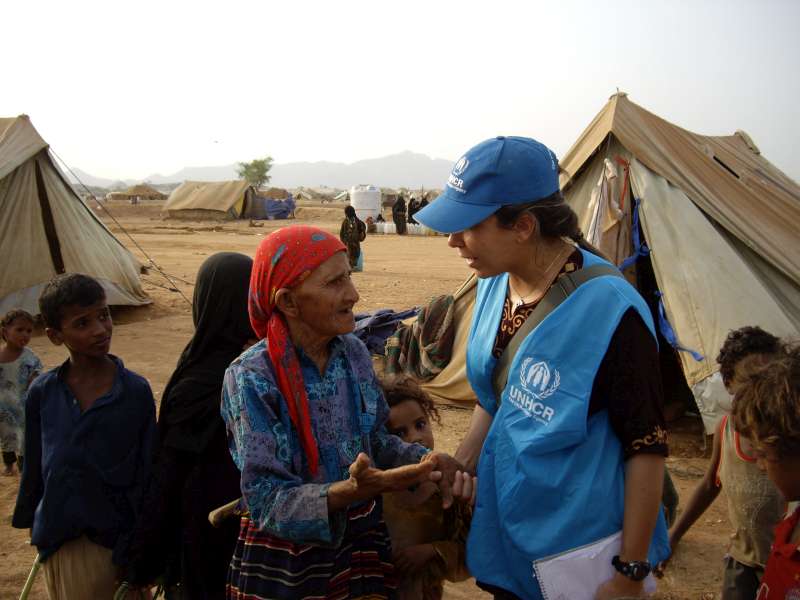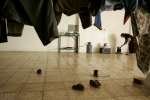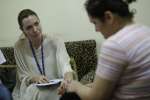- Text size
 |
|  |
|  |
| 
- Français
"My fear is to fail in assisting people in real need"
News Stories, 19 August 2010
BAGHDAD, Iraq, Aug. 19 (UNHCR) – For UNHCR Iraqi staff member Wafa, just going to work and returning home at the end of the day is a life-threatening experience. Elias Shalhoub, a psychologist and protection officer in Lebanon, says the challenge for him lies in discussing the needs of refugees and not knowing whether he can help. Martha Kow-Donkor, a field officer for UNHCR in Yemen, braves tribal checkpoints and minefields to help deliver aid to internally displaced people there. Her main worry is failing to reach people in time.
All three are struggling to balance the hardships, dangers and frustrations of their work with the UN Refugee Agency with the goal of helping some of the world's neediest people. On World Humanitarian Day they share some of their stories.
Hassan, 42, is an Iraqi national from Baghdad. He starts his day before sunrise and follows a different path to work each day, making the trip to work long and arduous. He hides his UN badge and conceals the nature of his work even from his closest friends and relatives.
"Nobody knows I work for the United Nations because for many people, the UN is the same as the U.S. ... Only my brother and my wife know for whom I work," Hassan says.
UNHCR Iraq employee Wafa, 39, says that the trip to work is long and tense: "One day a car bomb detonated in front of me," she says. Several people who travel the same route have been kidnapped and others killed.
"When I walk in the streets, I always look around me; it has become part of my nature," she says. Both Hassan and Wafa say they remain committed to helping those in need despite the constant risks.
Continued violence following the Canal Hotel bombing in Baghdad in 2003 that claimed the lives of 22 UN staff and wounded more than 150 has forced many humanitarian agencies, including UNHCR, to pull out staff and implement programmes from Jordan or the Kurdistan Region. UNHCR has had a presence in Iraq since the early 1980s but has relied mostly on its national staff for the implementation of its programmes. Senior staff returned to Iraq in 2008. The risks faced by UNHCR staff in Iraq – and most international and local humanitarian workers operating there – have also increased in recent years as militant groups target aid workers they consider an extension of the U.S.-led forces.
In neighbouring Jordan, Gamal Yacout, head of field unit and a longtime employee at UNHCR, says he has heard thousands of stories of pain, horror, death, and torture. Jordan is home to some 33,000 refugees, mostly Iraqis. "Working around the clock, especially in emergency situations, confronting tragedies, making critical and harsh decisions who is to benefit and who's not: these are my worries," he says.
Elias Shalhoub, 28, a psychologist, works closely with refugees and asylum seekers in detention centres in Lebanon. He counsels detainees, registers asylum seekers and those in need of international protection, and helps them apply for resettlement in third countries.
"I reach the point of banging my head against the wall when I see sick people in need of protection who are kept behind bars and our efforts to free them fail," says Shalhoub, who works with a small "detention" team at UNHCR. But there are also times when he says he is overwhelmed with joy at having successfully helped free detainees and ensured their departure to safety in a new country.
Anas al-Qaed, 25, is a community service worker in UNHCR's Damascus office. He recalls the case of a 14-year-old Afghani boy that left him emotionally depleted. The boy was traumatized by the loss of his family and by being repeatedly raped. It took four months of diligent effort by Anas to gain the trust of the boy who was physically abused and sexually molested.
"One of the most difficult aspects of the job is trying to maintain a distance from the daily horrors that we are exposed to," al-Qaed says. "But I enjoy this work because it allows me to make a difference in peoples' lives."
"I also believe in the importance of UNHCR's mandate, in the need to protect and assist refugees because if we don't do it, perhaps nobody else will," he says.
In Yemen, the recent conflict in the north has resulted in a huge displacement of the population, loss of life and mass destruction of homes and infrastructure. Humanitarian access is limited due to the presence of armed groups, tribal checkpoints, and land mines. The country is also suffering from piracy and terrorism.
Martha Kow-Donkor, associate field officer in UNHCR Yemen, braved the high-risk situation to deliver aid to internally displaced persons in Sa'ada Governorate where access was difficult.
"My fear is to fail in assisting people in real need," she says.
By Wafa Amr in Beirut and Helene Caux in Baghdad. Additional Reporting by Farah Dakhlallah, Nabil Othman, Sireen Khalifeh

































